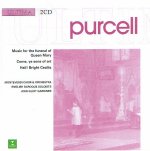This is a popular program of Purcell Odes, and although these performances are serviceable, others afford superior recorded sound and smoother, slightly more consistent readings. John Eliot Gardiner recorded the Queen Mary works–the birthday ode Come, ye sons of art away and the 1695 Funeral Music–as long ago as 1976. The Monteverdi Orchestra and Choir already were impressively disciplined under his leadership, and the four soloists were pretty good, too. But this analog recording, made in London’s Rosslyn Hill Chapel, isn’t well balanced, with the chorus sounding too small to compete with the supporting ensemble. Neither is there the clarity of diction you ideally need in music like this, and the reverberant setting doesn’t help the brass ensemble much, either. Nevertheless, Gardiner’s performance of the Funeral Music is a grand, stately affair, and it’s a pity the recording doesn’t do it greater justice.
The second disc contains a 1982 Barbican Concert Hall recording of the ode Hail! Bright Cecilia. It’s a capable realization, with some fine vocal contributions, particularly from bass David Thomas and baritone Stephen Varcoe. Orchestral playing from Gardiner’s English Baroque Soloists is assured, though again the recording lets down an otherwise admirable account. If you’re keen to explore these works through fine-sounding modern recordings, you’d be best advised to get the Virgin Veritas two-disc set by Andrew Parrott with the Taverner Consort, which also includes the ode Welcome all the Pleasures and the March and Canzona in C minor Z860. Virgin’s sound engineering is a huge advance on Erato’s for Gardiner, and the performances, if slightly more measured, have a firmer vocal presence that undoubtedly serves the listener’s interests much better.
































